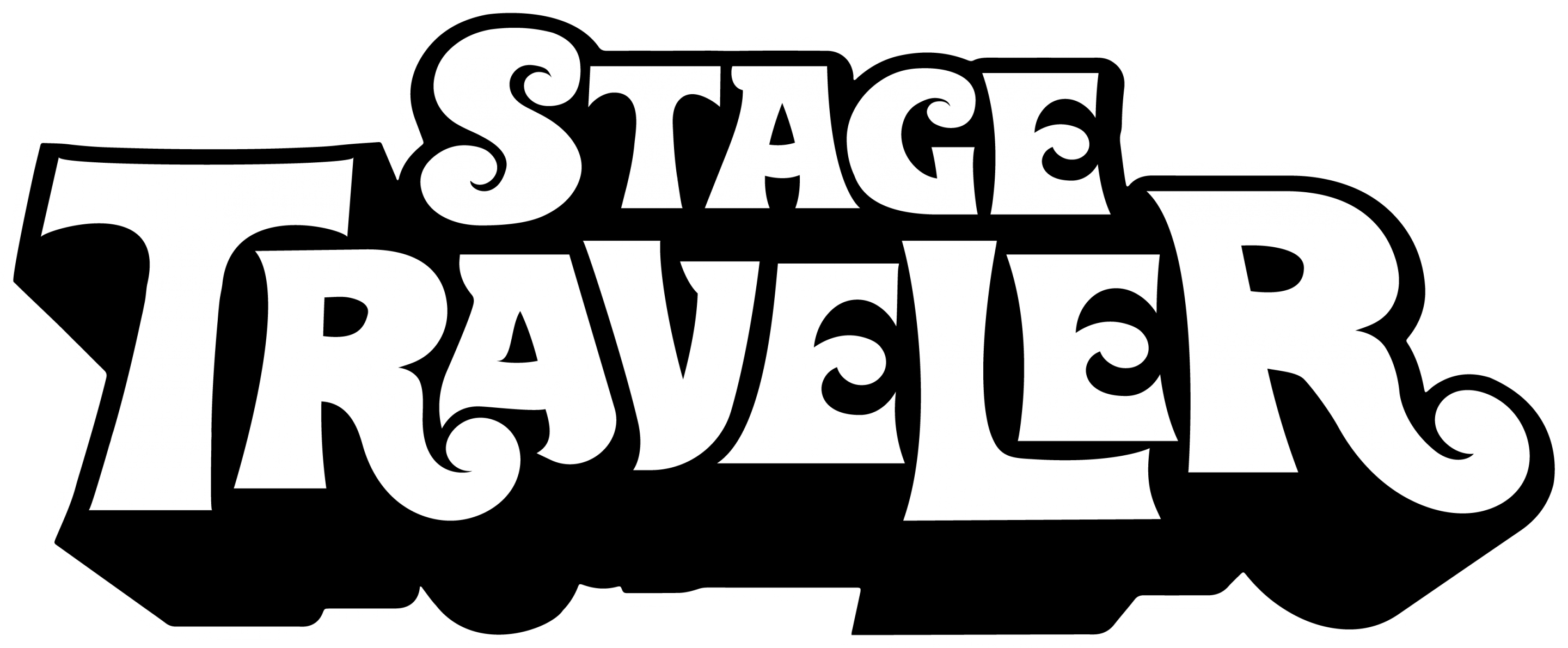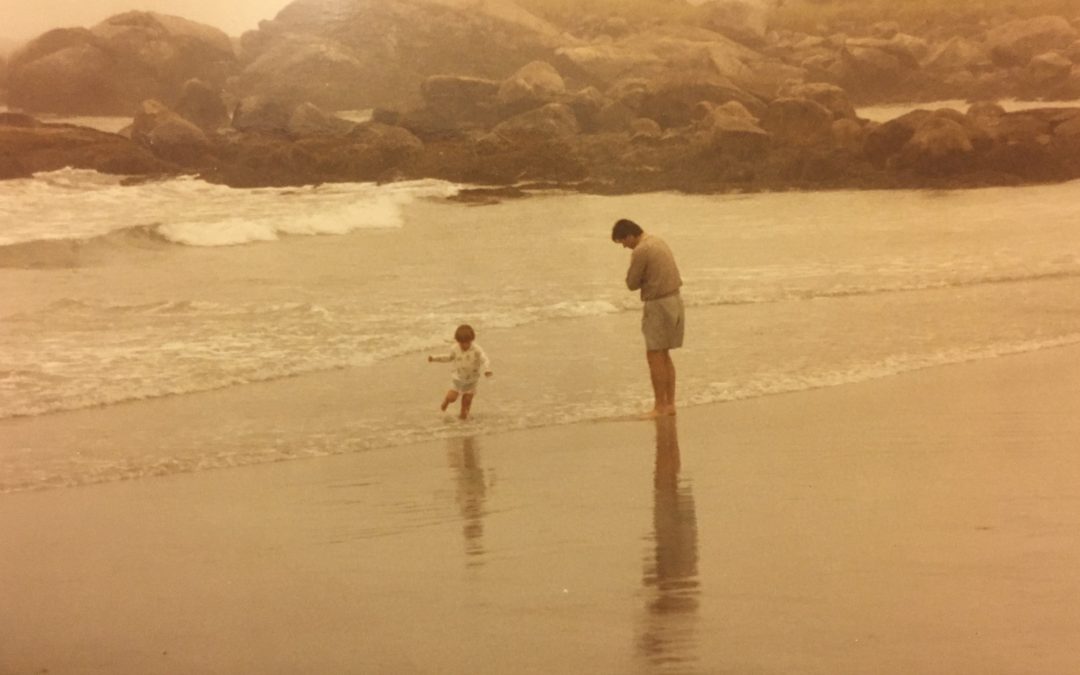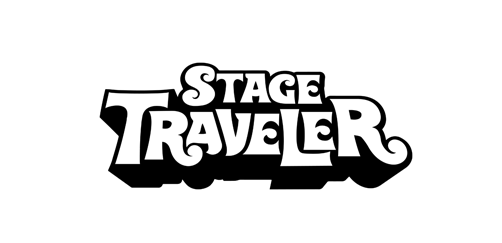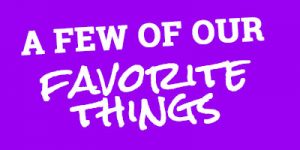TRAVELOGUE / LIFE / MUSINGS

Corey Bell, Stage Traveler & Blogger
One of Theses Things First:
Early Steps Down a Path Paved with Song
Sonic Highways: Musical Immersion on the Roads of America - (Introduction: Part I)
Back in 2013, after eight years, three schools, two breaks, two cities, and countless hours of struggle, determination, and eventual enlightenment, I finally earned my Bachelor's Degree. Five years later - almost to the day - it seems so long ago, especially having moved two MORE times and picking up a Master's Degree in the process. Yet it also seems like it wasn't too far back that I earnestly sent in my first horrible draft of what lies in the pages ahead - my undergraduate thesis for Goddard College's Individualized Studies program. It was a nightmare to behold, especially since my computer's motherboard died the DAY IT WAS DUE and I had to frantically drive my macbook down to New Haven in the middle of 4th of July traffic to ensure I would have it back before my advisor crucified me. Some things have changed - namely my career path and my city of residence - and some have not; I still am plagued with technological issues galore and have a terrible knack of mismanaging my time. Another thing that has not changed is my curiosity towards how music interacts with us humans, especially in regards to the places we experience.
As you may or may not know, Stage Traveler's ultimate goal is to delve deeper into this investigation, while also being entertaining, informative, and ultimately beneficial to the owners, operators, and employees of (and the artists who stop at) the unique, noteworthy venues of the world, by increasing awareness of the cool stuff they and the businesses and neighborhoods that surround them pride themselves in. But it really all boils down to this one question: why does it matter where we are when we experience music? Whether it's live or recorded, at an amphitheater or driving down a beautiful road at sunset -- where we are has a HUGE impact on what we feel when music is added to the equation.
So I'm revisiting this thesis, entitled "Sonic Highways: Musical Immersion on the Roads of America", as it pertains to the other side of the equation, but whose contextual academic side can lend some perspective on why certain music venues are so awesome in adding to our excitement and enjoyment of live music. So here goes: this three-part Introduction will be followed with stories, studies, playlists, and everything in between. And I hope it inspires you to explore your own musical journeys as I did here.
xo, C
I didn’t have your average high school graduation party.
While most kids celebrate the eve of their adulthood by congregating at a fellow student’s house (the one with the “cool parents” that collect car keys in a decorative bowl of some sort) while they get wasted on Jägermeister and bury themselves under mountains of red solo cups reeking of Budweiser backwash, I took a somewhat different approach. My graduation party lasted three whole days, and took place a thousand miles away from my alma mater.
It all started several weeks before I was set to get my diploma and march out of my small Connecticut prep school for the last time. A few friends of mine were planning on going to the Bonnaroo Music and Arts Festival, held annually in mid-June on a sprawling 700-acre farm an hour or so southeast of Nashville. Several people had attended the festival the previous year, and told tales of golden afternoons and long starry nights spent amongst the rolling hills of southern Tennessee, awash in a sea of endless music, reflecting with joy upon the bouncing parade of endless friendly faces. Combine that with a notoriously relaxed attitude towards any and all instruments of inebriation, and I was sold almost immediately on the idea. I begged my father for a ticket, assuring him that I would play it safe and that I would be traveling with friends knit from the fabric of responsibility, and, after some initial hesitant deliberation, he somewhat reluctantly agreed to finance my journey to the sticky south, and the gears were set in motion.
However, I was blissfully unaware at the time that this event was not only a major catalyst in the formation of what my life would eventually become, but also I was terribly blind that, in fact, my whole life had been leading up to this very moment.
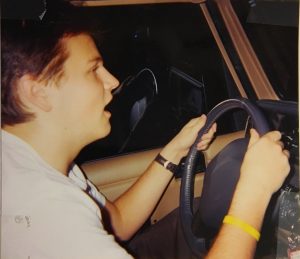 I grew up in a sleepy town in southern Connecticut, right along the shoreline, just a few miles from where the “mighty” Connecticut River feeds into Long Island Sound. Growing up there was a wonderful experience. I spent my days romping around a huge backyard and its surrounding forests, blazing trails and getting snagged on pricker bushes on a daily basis. On Sunday mornings I would wake up extra early to the smell of Pillsbury Cinnamon Rolls, and would hide out in my bedroom till noon to catch the Rick Dee’s Weekly Top 40, snatching my favorite songs and depositing them onto cassettes, tapes that I would use over and over until the tape wore thin and the songs started to bleed into one another. As I grew older, I became disenchanted with this practice—and waking up early in general— as well as the weekly tradition of isolating myself in my bedroom as I did so gleefully on Sunday mornings of youth. Instead I focused the majority of my energy on social engagements, like late movies at the multiplex that turned into sleepovers and Nintendo parties.
I grew up in a sleepy town in southern Connecticut, right along the shoreline, just a few miles from where the “mighty” Connecticut River feeds into Long Island Sound. Growing up there was a wonderful experience. I spent my days romping around a huge backyard and its surrounding forests, blazing trails and getting snagged on pricker bushes on a daily basis. On Sunday mornings I would wake up extra early to the smell of Pillsbury Cinnamon Rolls, and would hide out in my bedroom till noon to catch the Rick Dee’s Weekly Top 40, snatching my favorite songs and depositing them onto cassettes, tapes that I would use over and over until the tape wore thin and the songs started to bleed into one another. As I grew older, I became disenchanted with this practice—and waking up early in general— as well as the weekly tradition of isolating myself in my bedroom as I did so gleefully on Sunday mornings of youth. Instead I focused the majority of my energy on social engagements, like late movies at the multiplex that turned into sleepovers and Nintendo parties.
When I reached high school and ultimately got my own car, my last shreds of childhood seemed to drift away with the malicious winds of change, leaving me to spend my free time simply driving around southeastern Connecticut and loitering in Wendy’s parking lots smoking cigarettes. Not the most enriching experience perhaps, but it worked for me. Still, despite my almost comically cliché display of teenage rebellion (or as close to rebellion as one can get when living in Connecticut), I never sacrificed my taste in music. That’s something that I have held true to despite the many changes I have gone through in life. That is something that I will always hold onto. Even if I become a circus performer and start chowing down on light bulbs for supplemental income, I will always stand by my taste in music. And let me tell you why.
I credit my parents as the most influential parties in shaping my musical tastes, and thus they are basically responsible for my love of music. They grew up during the dawn of rock and roll and during the summer of love, and came of age during the 1970s, when music began to evolve from rock and roll and jazz into the plethora of genres that lay at our disposal today. As a child, my sister and I were inundated with a deluge of classic rock—The Beatles, Led Zeppelin, The Who, Queen, Simon & Garfunkel—as well as a healthy dose of more modern pleasures—Van Halen, Tom Petty, John Mellencamp, Paul Winter, etc. There was even a good year or so when in my early years of elementary school when all I wanted to hear was either Magical Mystery Tour or Sgt. Pepper’s Lonely Hearts Club Band. Every fucking day! Imagine being a parent and having to put up with that, and ultimately realizing that it’s your own damn fault for introducing the boy to the Beatles in the first place. Obviously, there are way worse albums for a kid to be obsessed with, but still, it must not have been pleasant.
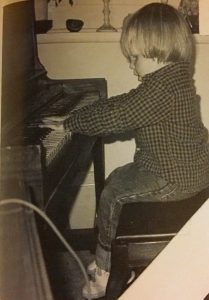
So young and sooooo talented (...or not).
After family dinners we would sometimes jam out to Queen’s “Bohemian Rhapsody,” and my father would fake-swing dance with us, throwing one of us in the air or pulling one of us through his knees, while my mother would teach us how to air guitar (“Bohemian Rhapsody” is a wonderful song to learn how to air guitar to). On our yearly summer vacations to Maine or Nova Scotia, my sister and I would laze around playing Stratego, or an over-sized version of checkers on the floor, as our parents cooked up refried bean tacos or Ninja Turtle-shaped macaroni and cheese, and we would all bob our heads and drum our fingers to the sounds of Paul Simon’s Graceland or Edgar Winter’s fantastic semi-concept album Entrance, though back then, we had no idea what in the hell a concept album was, nor did we care. All we cared about was the sound coming from whatever boom box or beat up stereo system that was provided with whatever cozy seaside cottage or cabin we had chosen to inhabit. That, and the fact that we were all together.
When my parents split up in 1996, my mother took it very hard. There were days that she would hole up in our downstairs bathroom and just cry, and it was up to my sister and I to coax her out and attempt to comfort her. Music became a very touchy subject during the beginning of their separation, because a lot of the stuff that we would listen to as a family would trigger a painful response within my mother if she heard it during that time. Even driving to a favorite restaurant of ours would cause the tears to well up in her eyes, and when Queen or Paul Simon would pop up on the local classic rock station, it needed to be changed swiftly to avoid a mid-highway breakdown (one not of the vehicular variety). Over the years, the musical aspect of my relationship that I shared with both my parents was chopped sloppily to pieces, like an onion diced by a dull knife in the hand of an amateur chef. I had to develop new musical relationships with each of my parents individually, which was difficult at first, but was ultimately rewarding in the long run.
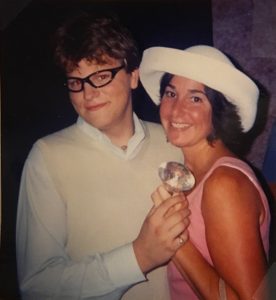
Me as Brad in a shadow cast of Rocky Horror Picture Show, c. 2003.
With my mother, I found common ground in musical theatre. Though my father was the one who took me to actual Broadway shows, my mother took the helm in exposing me to things like The Rocky Horror Picture Show (now my favorite film of all time) and the works of Stephen Sondheim. She also schooled me in the psychedelic teachings of Pink Floyd, as well as the great masters Lou Reed (and the Velvet Underground) and the Thin White Duke, Sir David Bowie himself.
My father took a more esoteric route, exposing me to the early work of Elton John, Roxy Music, Neil Young, and giving me my first taste of ambient music in the form of Brian Eno’s post-glam solo work. In middle school, he took me to go see the Moody Blues at the Mohegan Sun Arena. Before that show, I had only heard their song “Ride My See-Saw,” which back then I saw as a rather ridiculous and humorous song and only knew it as an inside joke with an older student. But that concert became a special memory for me, not only because it opened my eyes to the breadth and depth of the Moody Blues catalog (you haven’t heard “Nights in White Satin” until you’ve heard it live), but also it was the first show my father and I went to together, alone. And even though I wasn’t familiar with a lot of their music, it was a special moment for us to see a band—that he’s loved for years—together, and to find a new common interest. Plus, we had really good seats.
My father and I have a wonderful relationship. He has always been supportive in basically every decision I’ve made, and he has been a truly positive influence on me, and perhaps the best father a boy can ask for, despite his own insecurities on the matter. However, in earlier life, I felt like there may have been somewhat of a rift in our relationship. As a boy, all I wanted to do was play video games and play make-believe in my backyard. Occasionally I would dabble in some community theatre when I was really young, but most of my free time was spent either mashing buttons on my Super Nintendo controller or mashing the keys on our tragically out-of-tune Steinway piano.
My sister was always the sportier one, so I always felt a distance between my father and I in some respect due to the fact that I thought I was not what he wanted me to be, and she seemed to fill that void that I had left. In middle school, I found the theatre, as my passion and as my outlet. This was something that resonated more with my mother, and that’s how we initially bonded through musicals. I saw musicals as a fantastic outlet for my teenage angst, which was starting to brim, despite my effort in keeping it at bay with misguided forays into teenage partying/rebellion, which at the time seemed like the best agents for keeping surface tension and minimalizing spillage from said brimming. Musicals allowed me to channel my emotions in a way that could ultimately sidestep any situation in which I would have to be an actual adult and deal with them directly, yet rather I could access them indirectly through the characters and their written lines. It sounds unhealthy, I know, but when you’re filled to the lip with yucky teenage bullshit, the last thing you want to do is tackle it head-on and deal with it responsibly.
"That’s what being in high school is about: repression of emotion and doing just about everything you can to seem normal until you’re out of that hell-hole, right?"
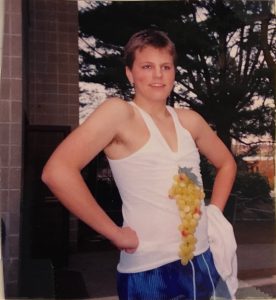
Pippin, c. 2003. (We had fun backstage)
That’s what being in high school is about: repression of emotion and doing just about everything you can to seem normal until you’re out of that hell-hole, right? Well, that’s what I thought, but then (cue the music) I found musical theatre. And as awful and cheesy as musical theatre can be (I admit it, and so should you), it really got me back on track and helped me establish a healthy expression of my emotions in an artistic form. Allow me to elaborate a bit here.
Musicals are often seen as ridiculous pieces of work. They carry with them a sort of detachment from reality that a lot of people have trouble getting on board with (thus why many people detest musical theatre). The whole spontaneous-bursting-into-song aspect is a big deal-breaker for a lot of people, as they have trouble associating with something that basically never, ever happens outside of the psychiatric wing of certain hospitals. Granted I can see where these people are coming from; it’s rather unreasonable to place any sort of realistic belief in any scenario where such a thing happens, especially when it takes up half of the friggin’ show. Those who are able to suspend disbelief enough to accept these circumstances are the ones who undoubtedly enjoy the experience, though admittedly, the idea is lost on many.
Similarly, musicals often have a lot of songs that, when taken out of the context of the play itself, make little to no sense. It’s hard to put most songs from Jesus Christ Superstar or Les Misérables into any other context other than a biblical rock opera or a libretto based on the French Revolution. But there are several exceptions, and those songs that do allow themselves to be interpreted within other situations speak perhaps more voluminously than their more commercialized counterparts. Because these songs are part of a story, they are often loaded with lyrical emotions that, in the context of musicals, are often backed with comparable and appropriate dramatic orchestration. It was these very songs that drew me to musical theatre in high school, because they gave me not only a voice to channel my emotions, but also an arena for me to do so. And honestly, they’re very well written songs. So lose the white wig for a second.
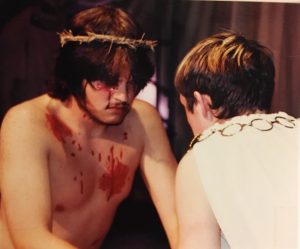
Yeah that's me, bleedin' Jesus. That crown of thorns was real, too. (2004)
Earlier I referenced Jesus Christ Superstar and Les Misérables because they, in fact, were the musicals that I was a part of in my junior and senior years of high school, respectively, which also turned out to be the most turbulent years for me emotionally, for a plethora of reasons stemming from insecurities I had about my sexuality, body issues, and the death of someone very dear to me. And although I couldn’t connect with my characters on a literal level (I’ve never been the son of God or a French police chief), the music in these plays allowed me to explore the deeper crevasses of my emotional labyrinth through an expulsion of emotion I experienced in singing these characters’ songs. When I would sing “Gethsemane (I Only Want To Say),” which is Jesus’s big solo in the second act of Jesus Christ Superstar in which he basically foresees his imminent demise and expresses his anger at God, I would often cry; not because the libretto demanded it, but because I could feel Jesus’s anger in the words I was singing and the orchestral landscape that Andrew Lloyd Webber had painted within the composition of that song. It brought out my own anger, my own despair, and that’s the real emotion that I was trying to reach, but perhaps could not grasp in regular self-exploration. I felt the same way during “Javert’s Suicide” in Les Misérables (I don’t think I have to really explain what happens at the end of that song), as I could identify with a man whose whole life views were shattered in a mere matter of minutes. I’m not saying I only did musicals to express my emotions—I genuinely had fun just playing the parts and doing the whole performance thing—but I’m also not saying that it didn’t help me sort out some heavy shit that I was dealing with. It was during these moments when I began to realize that music meant so much more to me than just a form of entertainment. Music had not only been an integral part of my relationships with my parents, but in my relationship with myself.
Sounds kind of crunchy, doesn’t it? Ha, I’m just getting started.
(Click Here For Part II: Yesterday's Modern Box)
